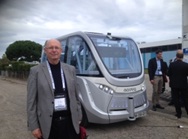Managing Director, Martin Leak attended the 22nd ITS World Congress in October. With a focus on intelligent mobility and better use of space, two of the more pressing concepts were the emergence of automation as a real focus for innovation that will not only lead to safer transport but also has the potential to change vehicle use and reduce individual vehicle ownership, and the changes of thinking around big data, which are creating a new paradigm for data sourcing, data sharing and data exchange.
Automation can improve efficiency, reduce fraud, help overall service management and contribute to service and policy outcomes. Automation of roads with effective incident detection and management can improve safety and efficiency. Automated management using decision support systems enables complex issues to be handled efficiently and effectively.
In the transport and mobility domains, satisfying individuals’ wishes for the best personal travel solution has long had priority over the needs of overall network management. The combination of better access to traditional transport related data and increasing availability of new sources of data coming from end users (smartphones, social media, crowd sourcing), transport and communication infrastructure and vehicles (probe data), creates a new paradigm for data sourcing, data sharing and data exchange. We may for the first time have the chance to satisfy the needs of both the users and the stakeholders in transport management.
Particularly interesting to Martin, was American speaker Abbas Mobaddes, who believes, “We are at a tipping point of emergence of mobility and information technologies… Connected and automated vehicle technologies are expected to have a profound impact on travel behaviour, research, operation, transportation business, and economies around the world.”




